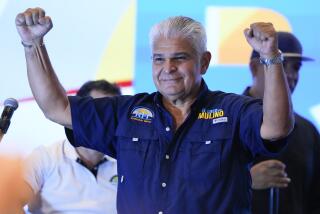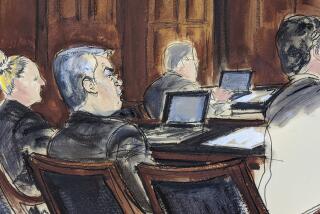Noriega Claims POW Status : But Judge Refuses to Grant Bond
- Share via
MIAMI — Deposed Panamanian dictator Manuel A. Noriega claimed status as a prisoner of war under the Geneva Convention and asked today to be moved to a neutral third country to avoid trial on U.S. drug charges.
The claim was mailed to President Bush in a letter signed by Noriega, who listed his title as commander-in-chief of the Panamanian Defense Force. A copy was contained in a motion filed in federal court today by defense attorney Frank Rubino.
Rejecting the court’s jurisdiction, Rubino said he would “respectfully decline” to participate in a scheduled pretrial detention hearing. But U.S. District Judge William Hoeveler ordered the hearing to continue. As expected, he denied bond, ruling that the defense had not rebutted the prosecution’s contention that Noriega might flee the country if freed on bail.
The hearing opened with Noriega appearing in uniform and Rubino reading his motion into the court record. The ousted strongman did not speak.
The defense contended that Noriega, who was whisked out of Panama on Jan. 3 to face a 1988 drug indictment in Miami, was a political prisoner captured as the result of an illegal military invasion in violation of international conventions, treaties and accords.
The motion recounted events leading up to Noriega’s arrest outside the papal nunciature in Panama City, including American troops’ use of high-intensity lights and loudspeakers playing rock music.
The judge acknowledged receipt of the motion but called it untimely and said he would give the prosecution time to respond.
The government, not the defense, had demanded the bond hearing, concerned that failure to guarantee Noriega the opportunity could jeopardize their case in both the legal and political arenas.
Rubino refused to ask for bond because Noriega does not recognize U.S. jurisdiction and, he said earlier, because “I don’t file motions I don’t expect to win.”
Noriega has been held in Miami on drug trafficking charges since his surrender to U.S. authorities in Panama on Jan. 3.
His arrest by U.S. agents followed the ousted strongman’s surrender from the Central American country’s Vatican Embassy, where he had fled on Christmas Eve after the Dec. 20 invasion by U.S. troops.
Noriega and 15 others were charged in a 12-count drug trafficking indictment returned Feb. 4, 1988, by a federal grand jury in Miami. If convicted, he would face a maximum penalty of 145 years in prison and a $1.1-million fine.
The indictment, which deals with alleged crimes committed between 1982 and 1986, accuses Noriega of providing protection for cocaine shipments from Colombia to the United States in return for $4.6 million from the Medellin cartel, which is responsible for about 70% of the cocaine that reaches the United States.
The indictment also accuses Noriega of allowing smugglers to set up a processing laboratory and letting them deposit profits in Panama banks.
Of the other defendants, five are in the United States awaiting trial.
In a Tampa indictment also unsealed Feb. 4, 1988, Noriega and two others are charged with arranging to smuggle nearly 1 million pounds of marijuana into the United States from 1982 to 1984.
More to Read
Sign up for Essential California
The most important California stories and recommendations in your inbox every morning.
You may occasionally receive promotional content from the Los Angeles Times.













